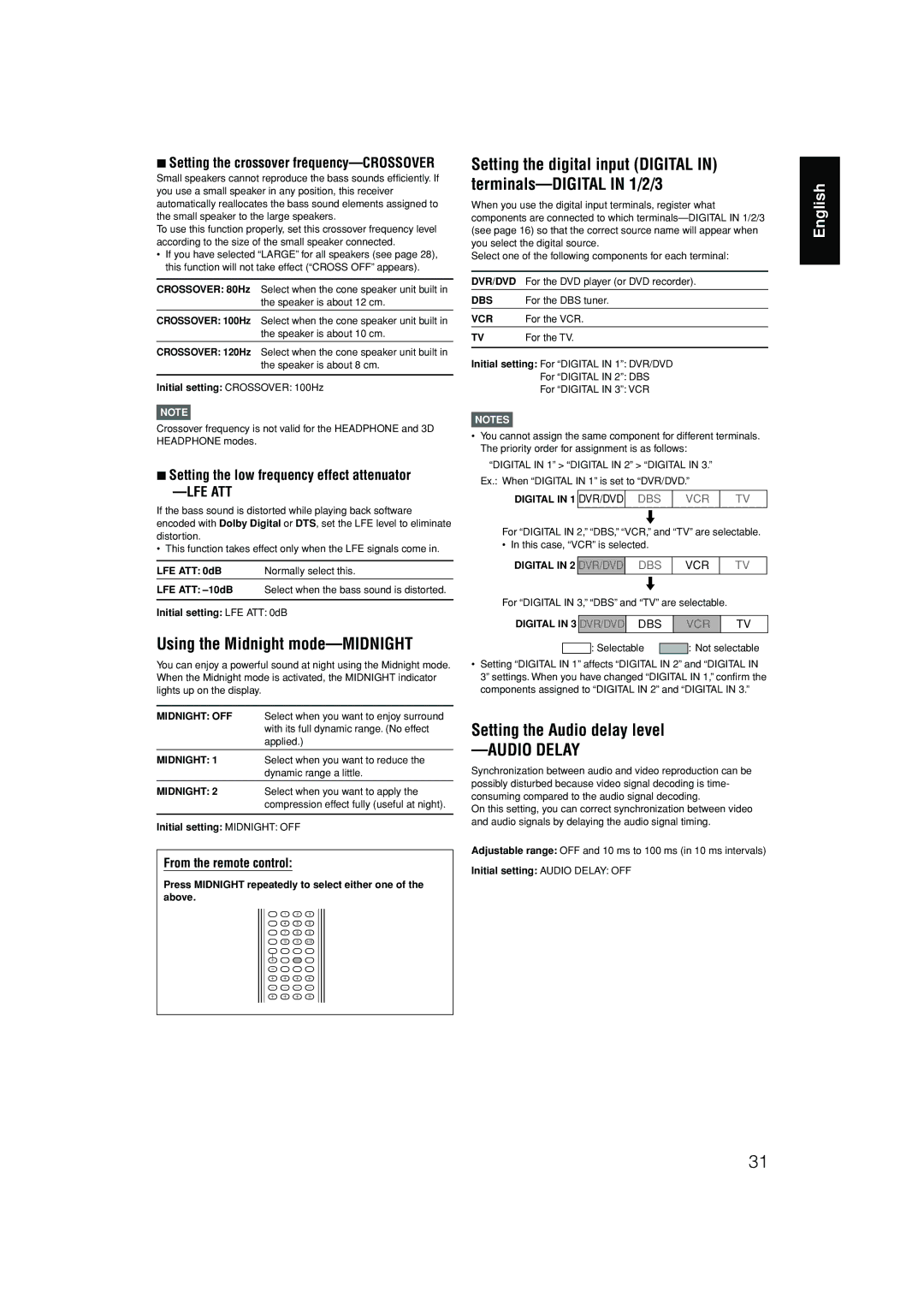
7Setting the crossover frequency—CROSSOVER
Small speakers cannot reproduce the bass sounds efficiently. If you use a small speaker in any position, this receiver automatically reallocates the bass sound elements assigned to the small speaker to the large speakers.
To use this function properly, set this crossover frequency level according to the size of the small speaker connected.
•If you have selected “LARGE” for all speakers (see page 28), this function will not take effect (“CROSS OFF” appears).
CROSSOVER: 80Hz Select when the cone speaker unit built in the speaker is about 12 cm.
CROSSOVER: 100Hz Select when the cone speaker unit built in the speaker is about 10 cm.
CROSSOVER: 120Hz Select when the cone speaker unit built in the speaker is about 8 cm.
Initial setting: CROSSOVER: 100Hz
NOTE
Crossover frequency is not valid for the HEADPHONE and 3D HEADPHONE modes.
7Setting the low frequency effect attenuator
—LFE ATT
If the bass sound is distorted while playing back software encoded with Dolby Digital or DTS, set the LFE level to eliminate distortion.
• This function takes effect only when the LFE signals come in.
LFE ATT: 0dB | Normally select this. |
LFE ATT:
Initial setting: LFE ATT: 0dB
Using the Midnight mode—MIDNIGHT
You can enjoy a powerful sound at night using the Midnight mode. When the Midnight mode is activated, the MIDNIGHT indicator lights up on the display.
MIDNIGHT: OFF | Select when you want to enjoy surround |
| with its full dynamic range. (No effect |
| applied.) |
|
|
MIDNIGHT: 1 | Select when you want to reduce the |
| dynamic range a little. |
|
|
MIDNIGHT: 2 | Select when you want to apply the |
| compression effect fully (useful at night). |
|
|
Initial setting: MIDNIGHT: OFF
From the remote control:
Press MIDNIGHT repeatedly to select either one of the above.
1 2 3
4 5 6
7 8 9
10 | 0 | 10 |
Setting the digital input (DIGITAL IN)
When you use the digital input terminals, register what components are connected to which
Select one of the following components for each terminal:
DVR/DVD For the DVD player (or DVD recorder).
DBS For the DBS tuner.
VCR For the VCR.
TV | For the TV. |
Initial setting: For “DIGITAL IN 1”: DVR/DVD
For “DIGITAL IN 2”: DBS
For “DIGITAL IN 3”: VCR
NOTES
•You cannot assign the same component for different terminals. The priority order for assignment is as follows:
“DIGITAL IN 1” > “DIGITAL IN 2” > “DIGITAL IN 3.”
Ex.: When “DIGITAL IN 1” is set to “DVR/DVD.”
DIGITAL IN 1 | DVR/DVD | DBS | VCR | TV |
|
|
|
|
|
For “DIGITAL IN 2,” “DBS,” “VCR,” and “TV” are selectable.
• In this case, “VCR” is selected.
DIGITAL IN 2 | DVR/DVD | DBS | VCR | TV |
|
|
|
|
|
For “DIGITAL IN 3,” “DBS” and “TV” are selectable.
DIGITAL IN 3 | DVR/DVD | DBS | VCR | TV | ||||
|
|
| : Selectable |
|
| : Not selectable | ||
|
|
|
|
| ||||
•Setting “DIGITAL IN 1” affects “DIGITAL IN 2” and “DIGITAL IN 3” settings. When you have changed “DIGITAL IN 1,” confirm the components assigned to “DIGITAL IN 2” and “DIGITAL IN 3.”
Setting the Audio delay level
—AUDIO DELAY
Synchronization between audio and video reproduction can be possibly disturbed because video signal decoding is time- consuming compared to the audio signal decoding.
On this setting, you can correct synchronization between video and audio signals by delaying the audio signal timing.
Adjustable range: OFF and 10 ms to 100 ms (in 10 ms intervals)
Initial setting: AUDIO DELAY: OFF
English
31
